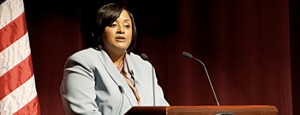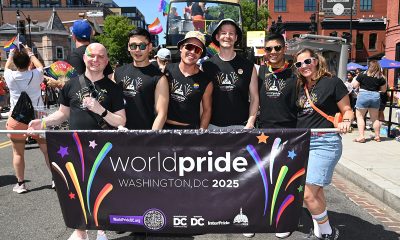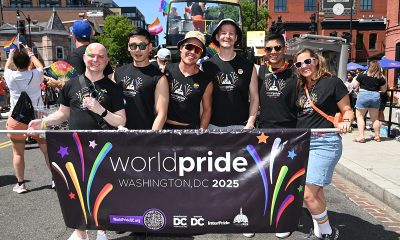Local
Local news in brief
Lesbian named president of Montgomery College & more

DeRionne Pollard is the new president of Montgomery College in Maryland. (Photo courtesy of Montgomery College)
Lesbian named president of Montgomery College
DeRionne Pollard, a lesbian who has served as California Community College’s president since 2008, has been named president of Montgomery College, a community college in Montgomery County, Md.
The college’s board of trustees announced her appointment May 18, saying Pollard, 39, was chosen following a nationwide search and a review of more than 50 applicants. She holds a doctorate degree in educational leadership and policy studies.
“Throughout the search process, Dr. Pollard impressed both the board and the search advisory committee by her passion and devotion to the advancement of the community college mission and the students we serve,” the board said in a statement.
In its announcement of her appointment, the board noted that Pollard and her domestic partner of more than 20 years, Robyn Jones, “are the proud parents of a 3-year-old son, Myles Julian Pollard-Jones.”
Pollard is the first known black lesbian to be named president of a U.S. college. Earlier this year, Grinnell College of Iowa named National Institutes of Health deputy director and physician Raynard Kington as its president, making him the nation’s first known black openly gay college president.
“I am thankful and truly honored that the board of trustees selected me as the next president of Montgomery College,” Pollard said. “I am impressed with the caliber of the faculty, staff, administrators and students at Montgomery College.”
The Washington Post reported that Pollard’s predecessor, Brian Johnson, was removed as president following allegations of overspending and “lapses in management.” The Post said faculty and staff at the college were looking forward to Pollard’s leadership after a tumultuous nine months of tension leading up to Johnson’s forced resignation.
Faculty and staff rose to their feet and greeted her with prolonged applause when she was introduced to them at an auditorium last week at the college’s Rockville, Md., campus.
LOU CHIBBARO JR.
Realtors approve LGBT non-discrimination policy
The Professional Standards Committee of the National Association of Realtors voted unanimously May 13 in Washington, D.C., to approve a policy prohibiting the denial of real estate-related services to someone based on his or her sexual orientation.
The action was proposed last year by the National Association of Gay & Lesbian Real Estate Professionals, which works closely with NAR, according to a statement by the gay group.
It calls for amending NAR’s code of ethics to add the term sexual orientation to a litany of other protected classes.
The amended policy, if ratified as expected by the NAR’s delegate body in November, would say, “Realtors shall not deny equal professional services to any person for reasons of race, color, religion, sex, handicap, familial status, national origin or sexual orientation.”
The proposal would also change the code of ethics to say, “Realtors shall not be parties to any plan or agreement to discriminate against a person or persons on the basis of race, color, religion, sex, handicap, familial status, national origin or sexual orientation.” It additionally says that Realtors or real estate firms shall not engage in discrimination based on the same litany of categories in employment practices for their offices.
If the delegate body gives final approval to the policy change, the change would take effect Jan. 1.
LOU CHIBBARO JR.
Stein Club endorses challenger in ‘shadow’ House race
The Gertrude Stein Democratic Club on Monday passed over the incumbent D.C. “shadow” member of the U.S. House of Representatives, whom it backed in the last two elections, and instead endorsed a little-known challenger for the ceremonial post.
In receiving 60.8 percent of the vote, challenger Nate Bennett-Fleming barely surpassed the required 60 percent threshold for obtaining the club’s endorsement, becoming the first non-incumbent to win the Stein backing this year. He beat incumbent Mike Pannetta, who the club endorsed in his 2006 and 2008 bids for the shadow seat.
“Tonight’s vote reflects a shift that I believe is happening within the District of Columbia, where we have younger voices standing up to take leadership,” said Jeffrey Richardson, the Stein Club’s president. “Nate Bennett-Fleming clearly has the support of his peers and a strong bloc of LGBT activists from across the city.”
D.C. voters approved the creation of one “shadow” U.S. House seat and two “shadow” U.S. Senate seats in a ballot initiative in the 1980s as part of their support for a D.C. statehood constitution. The positions have no powers or authority in Congress and don’t come with a salary.
Backers of D.C. statehood said they modeled the positions after other U.S. territories that created shadow congressional positions when they applied for statehood in the 1800s. People in the positions generally lobby Congress to approve D.C. as the nation’s 51st state and give the city budgetary autonomy and full voting rights in Congress.
Bennet-Fleming and Pannetta each expressed support for LGBT rights, including support for the city’s same-sex marriage law.
In a separate development, the club voted Monday to endorse the re-election bids of D.C. City Council members Mary Cheh (D-Ward 3) and Tommy Wells (D-Ward 6). The two are running unopposed in the September primary.
LOU CHIBBARO JR.
District of Columbia
D.C. Black Pride theme, performers announced at ‘Speakeasy’
Durand Bernarr to headline 2026 programming

The Center for Black Equity held its 2026 DC Black Pride Theme Reveal event at Union Stage on Monday. The evening, a “Speakeasy Happy Hour,” was hosted by Anthony Oakes and featured performances by Lolita Leopard and Keith Angelo. The Center for Black Equity organizes DC Black Pride.
Kenya Hutton, Center for Black Equity president and CEO, spoke following the performances by Leopard and Angelo. Hutton announced this year’s theme for DC Black Pride: “New Black Renaissance.”
Performers for 2026 DC Black Pride were announced to be Bang Garcon, Be Steadwell, Jay Columbus, Bennu Byrd, Rue Pratt and Akeem Woods.
Singer-songwriter Durand Bernarr was announced as the headliner for the 2026 festivities. Bernerr gave brief remarks through a video played on the screen at the stage.
DC Black Pride is scheduled for May 22-25. For more information on DC Black Pride, visit dcblackpride.org.
Virginia
Arlington LGBTQ bar Freddie’s celebrates 25th anniversary
Owner asks public to support D.C.-area gay bars

An overflowing crowd turned out Sunday night, March 1, for the 25th anniversary celebration of Freddie’s Beach Bar, the LGBTQ bar and restaurant located in the Crystal City section of Arlington, Va.
The celebration began as longtime patrons sitting at tables and at the bar ordered drinks, snacks, and full meals as several of Freddie’s well-known drag queens performed on a decorated stage.
Roland Watkins, an official with Equality NoVa, an LGBTQ advocacy organization based in the Northern Virginia areas of Arlington, Alexandria, and Fairfax County, next told the gathering about the history of Freddie’s Beach Bar and the role he said that owner Freddie Lutz has played in broadening the bar’s role into a community gathering place.
“Twenty-five years ago, opening a gay bar in Arlington was not a given,” Watkins told the crowd from the stage. “It took courage, convincing, and a deep belief that our community belongs openly, visibly, and proudly,” he said. “And that belief came from Freddie.”
Watkins and others familiar with Freddie’s noted that under Lutz’s leadership and support from his staff, Freddie’s provided support and a gathering place for LGBTQ organizations and a place where Virginia elected officials, and candidates running for public office, came to express their support for the LGBTQ community.
“Over the past 25 years, Freddie’s has become more than a bar,” Watkins said. “It has become a community maker.”
Lutz, who spoke next, said he was moved by the outpouring of support from long-time customers. “Thank you all so much for coming tonight and thank you all so much for your support over the past 25 years,” he said. “I can’t tell you how much that means to me and how much it’s kept me going.”
But Lutz then said Freddie’s, like many other D.C. area gay bars, continues to face economic hard times that he said began during the COVID pandemic. He noted that fewer customers are coming to Freddie’s in recent years, with a significant drop in patronage for his once lucrative weekend buffet brunches.
“So, I don’t want to be the daddy downer on my 25-year anniversary,” he said. “But this was actually the worst year we’ve ever had,” he added. “And I guess what I’m asking is please help us out. Not just me, but all the gay bars in the area.” He added, “I’m reaching out and I’m appealing to you not to forget the gay bars.”
Lutz received loud, prolonged applause, with many customers hugging him as he walked off the stage.

In an official statement released at the reveal event Capital Pride Alliance described its just announced 2026 Pride theme of “Exist, Resist, Have the Audacity” as a “bold declaration affirming the presence, resilience, and courage of LGBTQ+ people around the world.”
The statement adds, “Grounded in the undeniable truth that our existence is not up for debate, this year’s theme calls on the community to live loudly and proudly, stand firm against injustice and erasure, and embody the collective strength that has always defined the LGBTQ+ community.”
In a reference to the impact of the hostile political climate, the statement says, “In a time when LGBTQ+ rights and history continue to face challenges, especially in our Nation’s Capital, where policy and public discourse shape the future of our country, together, we must ensure that our voices are visible, heard, and unapologetically centered.”
The statement also quotes Capital Pride Alliance CEO and President Ryan Bos’s message at the Reveal event: “This year’s theme is both a declaration and a demand,” Bos said. “Exist, Resist, Have Audacity! reflects the resilience of our community and our responsibility to protect the progress we’ve made. As we look toward our nation’s 250th anniversary, we affirm that LGBTQ+ people have always been and always will be part of the United States’s history, and we will continue shaping its future with strength and resolve,” he concluded.
-

 District of Columbia5 days ago
District of Columbia5 days agoCapital Pride board member resigns, alleges failure to address ‘sexual misconduct’
-

 India4 days ago
India4 days agoActivists push for better counting of transgender Indians in 2026 Census
-

 Advice4 days ago
Advice4 days agoDry January has isolated me from my friends
-

 District of Columbia4 days ago
District of Columbia4 days agoCapital Pride reveals 2026 theme




















